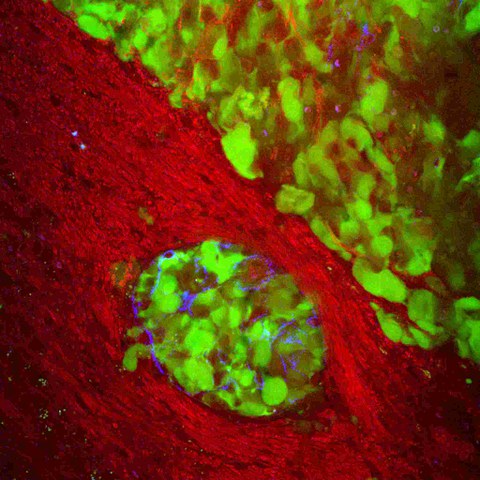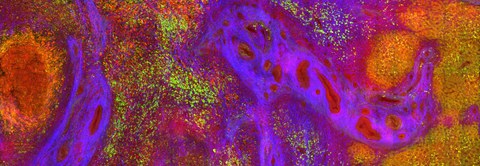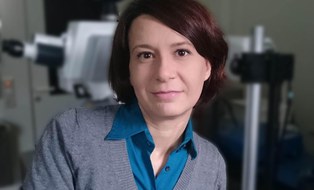Multimodal CARS microscopy: Label-free tissue imaging and optical histopathology
The Coherent anti-Stokes Raman scattering (CARS) microscopy is based on a nonlinear variant of Raman scattering. It enables tissue imaging by means of the compositional contrast derived from different lipid contents. In the nervous tissue, tumors and trauma induce tissue alterations that are characterized by a decrease of the lipid content in the affected regions. These alterations can be retrieved by CARS microscopy in label-free manner. CARS microscopy provides chemical selectivity, subcellular resolution and the

Green fluorescent tumor cells in mouse brain
high acquisition speed necessary for in vivo and in situ investigations. Moreover, it can be combined with other nonlinear imaging modalities on the same laser scanning microscopy device, namely two-photon excited fluorescence (TPEF) and second harmonic generation (SHG).In the clinical field, this multimodal and label-free technique has the potential for intraoperative imaging of tumors and in situ tissue pathology. Currently, intraoperative pathology is performed on biopsies: it slows down the operative procedure and neoplastic tissue is recognized only a posteriori. Providing the surgeon with a fast method to discern in situ between normal and neoplastic tissue would greatly improve the possibility of a complete tumor resection by sparing healthy functional tissue. We are currently applying the technique in different research areas to visualize relevant pathological information:
- Neurosurgery: detection of brain tumors, investigation of spinal cord injury in animal models (in collaboration with Neurosurgery, Dresden).
- Visceral surgery: detection of liver cancer, investigation of other pathological liver tissue changes (in collaboration with Visceral, Thoracic and Vascular Surgery, and with the experimental and molecular cardiology Lab, Dresden).
- Cardiac surgery: study of aortic valve stenosis and other changes in myocardial tissue, characterization of innovative valve implants (in collaboration with Heart Center Dresden).
- Other applications of experimental medicine on different animal models (e.g. C-elegans in collaboration with MPI-CGB Dresden)

Liver cancer (left: metastatic tumor, right: normal liver tissue)
Contact
 © Ortrud Uckermann
© Ortrud Uckermann
Ms Roberta Galli PhD
Send encrypted email via the SecureMail portal (for TUD external users only).
Clinical Sensoring and Monitoring
Clinical Sensoring and Monitoring
Visiting address:
Medizinisch-Theoretisches Zentrum (MTZ - Haus 91) Fiedlerstraße 42
01307 Dresden
